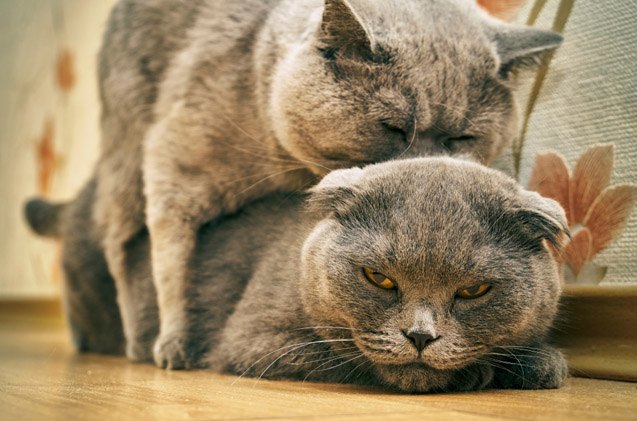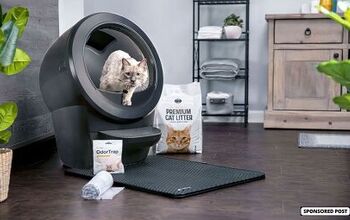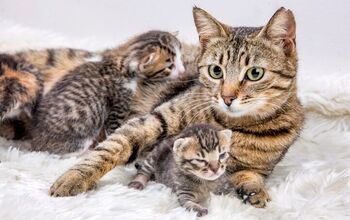Having the Awkward Talk About Cats Humping

Cats can do some pretty strange things, at times. They always want to cuddle when you’re in the middle of something important and they’ll knock things off the counter just to spite you. One behavior that is a little more than strange – it’s downright shocking – is cat humping. You might notice your kitty humping a blanket, their favorite pet bed, or another soft surface, or they might even end up humping another cat if they live in a multi-cat household. And you might stand there wondering why your furry friend is doing it, especially if your pet is spayed or neutered.
It isn’t uncommon for dogs to exhibit this behavior, but what does it mean when your cat does it? We tackle this interesting topic below to help shed some light on why some kitties might act a little weird sometimes.
Side note: If you are concerned about your cat’s behavior for any reason, such as if they started humping out of nowhere and you can’t figure out why or they are exhibiting some other new behavior that just doesn’t seem right to you, contact your veterinarian or a feline behaviorist for some guidance. If you can figure out the cause of your pet’s behaviors, no matter how strange those actions might be, you can more easily find ways of deterring unhealthy and unwanted behaviors.
Why Do Cats Hump?
Though you may think of it as a primarily male behavior, female cats will sometimes hump things as well. What is it that inspires this behavior? The cause may vary.
Related: Why Do Cats Go Crazy at Night?
Generally speaking, humping is a sexual behavior that is primarily seen in unaltered cats. There are cases, however, when a cat that has been spayed or neutered will exhibit this behavior as well. In these cases, it is possible that the cat wasn’t altered at a young enough age to prevent him from developing the sex hormones that trigger this kind of behavior. Even if your cat was altered at a young age, if the surgery was done very recently he could still have some sex hormones in his body for a full 6 to 12 weeks afterward.
Another potential cause for humping behavior in cats is stress or boredom. If you have an older cat that has never exhibited this behavior before, it may be a stress reaction to sudden change in the home environment. Have you added a new pet (particularly another cat) to your family or made some other significant change? If not, it may be a response to boredom or pent-up energy. If your cat doesn’t get enough play time or attention he may exhibit unwanted behaviors like humping.
Remember, female cats and male cats might hump every now and them. When it comes to male cats, in particular, they might hump other male kitties to exert their dominance. And what’s also surprising is that older kitties, including spayed female cats, might end up humping kittens too.
Other times, a cat might start humping as a result of a medical condition. For example, if a cat has a urinary tract infection (UTI), they might end up exhibiting humping behavior. This is another reason why consulting with a vet is a smart path to take if you notice humping that isn’t normal behavior for your kitty. If there is an underlying medical problem that’s to blame, you’ll definitely want to work with your vet to provide the right treatment and help your cat feel better.
What Can You Do to Discourage the Behavior?
Before you start thinking about ways to discourage humping behavior in your cat, ask yourself whether it’s really necessary. Humping can be an annoying or embarrassing behavior to witness, but it probably isn’t hurting anyone.
Related: Decoding the Mysterious Habits of Cats
Even so, you should take the time to figure out what it is that is causing the behavior and remedy the problem – this may reduce or completely eliminate the behavior without you having to do much. Whatever you do, don’t punish your cat for humping – not only will it be ineffective, but it could scare your cat and cause more stress. It could even cause your cat to fear you which is not good for either of you.
If you have determined that your kitty is humping because of stress, boredom, or not having enough territory to call their own, you can take steps to alleviate these issues. For example, you can provide more enrichment by giving your cat a wider variety of toys to play with even when you aren’t home or available to play. You can also use various window perches, wall perches, cat trees, etc. to give your cat more places to call their own, and to increase the amount of vertical space that is available throughout your home, as your feline friend is sure to love running, jumping, and climbing to a high spot where they can look at what’s going on below them. And if you think that the humping is due to stress, there are products like feline pheromone diffusers that might help bring a sense of calm to your cat.
Making sure your pet gets plenty of attention and affection from you is really important if you want to help your kitty feel content and at ease. So, take some time every day to show your feline friend how much you care. Snuggle with your cat, play with them, and give them treats. These are all great ways to reduce boredom and stress as well.
Humping Behavior in Cats: A Surprisingly Normal Behavior
Cats can be very odd at times and it is sometimes difficult to understand their behavior. What you need to remember about humping behavior is that, while it may be annoying to you, it is completely natural and there is probably a reason for it. If you don’t want your cat to exhibit this behavior, try giving him a little more attention and work some extra play time into your day. If you suspect that stress is an issue, do what you can to remedy the problem.

Kate Barrington is the loving owner of two cats (Bagel and Munchkin) and a noisy herd of guinea pigs. Having grown up with golden retrievers, Kate has a great deal of experience with dogs but labels herself a lover of all pets. Having received a Bachelor's degree in English, Kate has combined her love for pets and her passion for writing to create her own freelance writing business, specializing in the pet niche.
More by Kate Barrington























